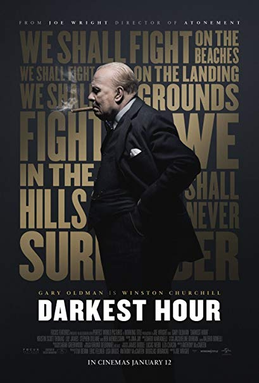| Darkest Hour | |
|---|---|
 |
by Peter J. O'Connell
Darkest Hour. Released: Dec. 2017. Runtime: 125 mins. MPAA Rating: PG-13 for some thematic material.
Superheroes of many types and their special weapons populate today's movie screens, usually fighting to save civilization. Few, however, are short, portly, balding, aging, cigar-chomping, liquor-loving curmudgeons whose weapons are . . . words and will. Such, however, was Winston Churchill. How this real-life unlikely superhero saved civilization from the barbarism of Naziism is told in Darkest Hour, directed by Joe Wright.
It's May 1940, and Hitler's blitzkrieg has begun to roll across Western Europe. On May 10 King George VI (Ben Mendelsohn) reluctantly replaces appeasement-minded Neville Chamberlain (Ronald Pickup) as Prime Minister with the controversial Winston Churchill (Gary Oldman). In a speech to Parliament, Churchill says that he can offer only “blood, toil, tears, and sweat.” For purposes of national unity, Churchill puts together a War Cabinet with representatives of a number of political tendencies. Among them are Chamberlain and Chamberlain's ally Viscount Halifax (Stephen Dillane).
Chamberlain and Halifax plot to oust Churchill and propose calling on Mussolini (Italy is not yet in the war) to mediate a negotiated settlement between Britain and the Third Reich. Churchill is adamantly against such a settlement. Pressure mounts on the PM, however, as country after country falls to the Nazis, and the only effective opposition is the British Army, which becomes trapped in France at Calais and the beaches of Dunkirk.
The pressure causes Churchill to engage in splenetic outbursts, some directed at his new secretary, Elizabeth Layton (the lovely Lilly James). Winston's beloved wife, Clementine (Kristin Scott Thomas), counsels him to moderate his behavior so as to win people over to his point of view. (Thomas' hairstyle deserves to share some kind of “Hirsute Phenomenon of the Year” award along with Kenneth Branagh's mustache in Murder on the Orient Express.)
Churchill does become gentler with Elizabeth, who comes to admire him greatly, but his political energy level does not drop. Whether he's dashing about at home in a bathrobe simultaneously drinking and dictating a message or speech or scurrying through the underground labyrinth of tunnels, corridors, and rooms where the war planning takes place, he is a human dynamo. That dynamo is superbly recreated in Gary Oldman's performance. Just as with Helen Mirren as Elizabeth II in The Queen (2006), Oldman, an actor of average height and build in real life, makes us believe for every second of the film that he is, both physically and in terms of personality, Winston Churchill.
As it proceeds, the film begins to develop its own form of pulse-pounding suspense, although it does not show combat action such as Christopher Nolan's Dunkirk did earlier this year. Churchill must make his way through difficult decisions regarding the foreign enemy and the plotting of domestic enemies, just as he must make his way through that labyrinth of tunnels, corridors, and rooms beneath the surface.
The tension reaches a peak when Churchill sacrifices the British force at Calais in an effort to save the much larger force at Dunkirk. He is accused of being a butcher, but when he launches the extraordinary military-civilian Operation Dynamo to rescue the troops at Dunkirk, the way is cleared for Britain to fight on and for Churchill to make an epic speech. Before he makes the speech, however, the movie has a scene of Churchill in the London subway that is apocryphal but accurately reflects the resoluteness of the British people at the time, despite the lack of that trait in some of their politicians.
The speech that Churchill goes on to make on June 4, 1940, is the famed and inspirational “We shall fight . . . we shall never surrender” one. Chamberlain and Halifax now know that they are defeated and that Britain is ready to fight on for as long as it takes to achieve victory. The movie then gives Edward R. Murrow's famous line about Churchill to Viscount Halifax: “He mobilized the English language and sent it into battle.” Wright's Darkest Hour is a superlative salute to one of history's true superheroes.
No comments:
Post a Comment